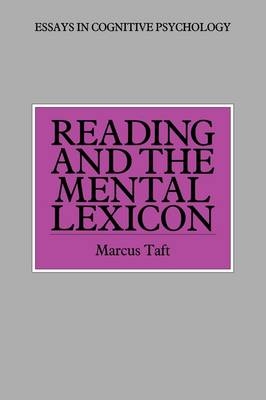
Reading and the Mental Lexicon
Psychology Press Ltd (Verlag)
978-0-86377-335-8 (ISBN)
Over the last twenty years a major area of cognitive psychology has developed centred upon research into the issues of how visually presented words are processed so that they can be read and understood. The focus has been on how words are stored in the mental lexicon and retrieved during the reading process. If we possessed no mental lexicon, we would be unable to read. This book dedicates itself to a critical evaluation of the ideas that have emerged from this body of research.
The text outlines the major models of lexical processing that have been put forward in the literature, and how they explain the basic empirical findings that have been reported. It then goes on to consider the possible influence that sentential context has on lexical processing, the impact of the pronunciation of a word on its visual processing, and the role played by internal word structure (i.e., syllables and morphemes) in the recognition of a word. A connectionist style model emerges during the course of the evaluation of these issues.
This book is suitable for advanced students and researchers, and is intended to serve as a springboard for discussion and an inspiration for empirical research.
Marcus Taft
Part I: Introduction. Models of Lexical Access. Finding an Appropriate Task. Basic Lexical Decision Findings. Part II: Evaluation of Models. Explaining the Frequency Effect. Explaining the Lexical Status Effect. Explaining the Nonword Legality Effect. Explaining the Word Similarity Effect. Explaining Repetition Priming Effect. Explaining the Degradation Effect. Overview of the Strengths and Weaknesses of the Models. Is the Lexical Task Appropriate? Part III: Semantic and Syntactic Influences in Lexical Processing. Effects of Semantic Characteristics of Isolated Words. Effects of Word Class. Beyond the Isolated Word. Tachistoscopic Recognition of Words in Context. Single Word Contexts. Sentence Contexts. Accessing Ambiguous Words. Syntactic Contexts. Conclusion. Part IV: Phonological Recoding. Homophony and Pseudohomophony. Form-priming. Articulatory Suppression. Regularity Effects. Consistency Effects. A Multiple-Levels Model. Pronouncing Nonwords. Overview. Part V: Morphographic Processing. Morphological Decomposition. Syllables. The Interactive-Activation Model Modified. Part VI: Conclusions and Future Directions. Overview. The Use of Simulations. A Distributed Connectionist Model. Processing in Languages other than English.
| Erscheint lt. Verlag | 7.12.1993 |
|---|---|
| Reihe/Serie | Essays in Cognitive Psychology |
| Verlagsort | Hove |
| Sprache | englisch |
| Maße | 152 x 229 mm |
| Gewicht | 300 g |
| Themenwelt | Geisteswissenschaften ► Psychologie ► Allgemeine Psychologie |
| Geisteswissenschaften ► Psychologie ► Verhaltenstherapie | |
| Geisteswissenschaften ► Sprach- / Literaturwissenschaft ► Sprachwissenschaft | |
| Sozialwissenschaften ► Pädagogik | |
| ISBN-10 | 0-86377-335-4 / 0863773354 |
| ISBN-13 | 978-0-86377-335-8 / 9780863773358 |
| Zustand | Neuware |
| Informationen gemäß Produktsicherheitsverordnung (GPSR) | |
| Haben Sie eine Frage zum Produkt? |
aus dem Bereich


